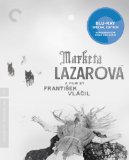| Reviews & Columns |
|
Reviews DVD TV on DVD Blu-ray 4K UHD International DVDs In Theaters Reviews by Studio Video Games Features Collector Series DVDs Easter Egg Database Interviews DVD Talk Radio Feature Articles Columns Anime Talk DVD Savant Horror DVDs The M.O.D. Squad Art House HD Talk Silent DVD
|
DVD Talk Forum |
|
|
| Resources |
|
DVD Price Search Customer Service #'s RCE Info Links |
|
Columns
|
|
|
Marketa Lazarova: The Criterion Collection

Please Note: The images used here are from stills provided by The Criterion Collection and promotional materials and are not taken from the current Blu-ray edition under review.
One of the reasons that Czech writer Vladislav Vancura's 1931 novel Marketa Lazarova has long been considered a notorious challenge to translators is that its avant-gardism -- its intentional but rewarding difficulty -- comes in the form of very specific, local, highly archaic colloquialisms in vocabulary and grammar that make it a more authentically "medieval" experience, rendering concrete some of the texture of that dark, scantily documented pre-Renaissance period of European history. But, as they say, "The language of film is universal," and the Czech director Frantisek Vlacil's 1967 film of version Marketa Lazarova, voted in a 1998 poll of Czech critics as the best film ever produced by that country and now appearing on Region 1 home video for the first time ever, is a case in point. If the novel's aim was to make the rhythms, textures, and modes of consciousness in the always-endangered, superstition- and mysticism-bound human existence of the Middle Ages immediately present for the reader, then Vlacil's film accomplishes the rare feat of actually, faithfully transposing the essence of a great work of literature onto celluloid, "translating" the by turns grimy and gorgeous qualities of a moment in our past -- one marked by extremes of fear and exaltation from which almost all of contemporary, rationalistic, post-Enlightenment Western civilization is utterly removed -- clearly and boldly into the cinematic language of image, sound, montage, and performance.
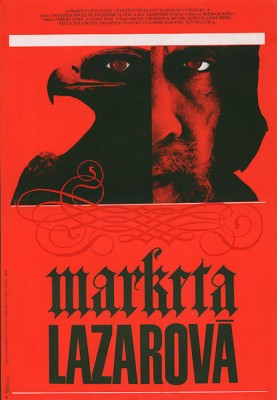
The director employs strikingly innovative ways of forming, and immersing us into, the archaic, sublime, and brutal onscreen world he's envisioned: As he tells the story of a murderous vendetta, ultimately encompassing everything from kidnapping and violent thievery to retributive assault and murder to rape and crucifixion, that develops between two clans dwelling in the wildernesses and fields of middle Europe in the 13th century -- the Kozlics, a horde of grown sons, clad in animal skins and inhabiting a squalorous, mud-drenched compound after having been bred into bandits by their viciously punitive, stern, avaricious father (Josek Kemr); and the superficially more ethical merchant Lazar, whose beautiful, innocent daughter, Marketa (Magda Vasaryova), has been promised to a nunnery that sits, paradisiacally, atop a nearby hill, the newly powerful Catholic Church the one reasonably safe haven in a way pre-urban world of few laws -- he seems determined to delight and disorient us in equal measure. That holds true whether you're speaking narratively (with the film's explicitly episodic structure dividing the story into discrete, loosely associated, not strictly successive or continuous slabs via regularly appearing, prefacing intertitles introducing the next section in verse) or, most especially, in the film's visual and montage style (developed through the regularly astonishing collaborations of cinematographer Bedrich Batka and editor Miroslav Hajek), which can turn on a dime from dizzyingly shaky, visceral handheld point-of-view shots (taken from, say, behind a horse as a character is swept in a wagon across the plains and through the forests) to the most painterly, precisely detailed and arranged, statically-framed compositions, from claustrophobia and darkness to vast, sunlit open spaces dotted with animal and/or human figures. (This love of kinetic, elaborate motion alternating with a precise compositional elegance and measurement suggests that Vlacil was inspired by, or at least shared, some of the creative impulses behind other behind-the-iron-curtain cinematic milestones and masterpieces of the time, most particularly Mikhail Kalatozov's fluidly-moving I Am Cuba and Andrei Tarkovsky's own, stately medieval epic, Andrei Rublev.) The insistent division of the story into those episodic chunks lends the period-perfect feel of an epic poem, The Song of Roland or The Divine Comedy or the Nibelungenlied. Ditto for what's contained within the segments, each with an internal, teeming, quasi-musical structure all its own -- densely onrushing action, half-real flights of madness or divine visions, jam-packed with violence, violations, betrayals, reversals that blur into flights of lyricism that transcend psychology or "character" as we think of it -- traces and rhymes of which can be recognized as points of cross-referencing connection in the others, roughly but pleasingly binding the parts together (Marketa's father's mysterious vision from near the beginning returns, altered but recognizable, for a glorious reprisal and expansion near the end).
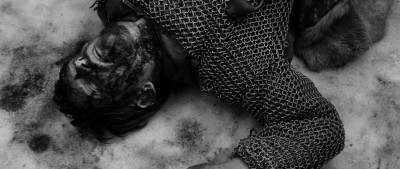
So, Vlacil is faithfully, appropriately, and fruitfully working on a huge canvas, in archetypes and iconography much more than characters, psychology, or plot. The ways the film's people behave -- their almost uniform, automatic and brutal thievery and violence; the incest between seductive, erotically-charged Kozlics daughter Alexandra (Pavla Polaskova) and her aptly-named brother Adam, resulting in their cruel father chopping off Adam's arm; the kidnapping and ultimate murder of a wayward young German noble (Vlastimil Harapes) that gives rise to the feud between the Kozlics and the Lazars, since the merchant won't join the grubby bandits in their fight against the king's army sent to retrieve their hostage and beats nearly to death the wolfen Kozlic son, Mikolas (Frantisek Vehecky) for the trouble of requesting such aid; and, most disturbingly of all, the punitive kidnapping and rape of the virginal future nun Marketa by the feral Mikolas and her falling in love with her brutal captor -- are beyond socially unacceptable to us, and in the context of any contemporary story would be merely lurid, gratuitous, and sensationalistic. But it isn't, no more so than similarly relentless, gruesome, and nightmarish elements in the Bible or Shakespeare, because Vlacil unfailingly maintains a pre-social, pre-civilized, elemental and primal aura (albeit, paradoxically, through an inventive, advanced, and very fine-tuned deployment of cinema's visual and aural technological apparatus) throughout, consistently maintaining the rich, detailed, but distanced perspective of a prophet or ancient storyteller, making the story's very significant emotional payload something cumulative and communal, a big-picture matter not dependent on later concepts like happy/sad endings or individual identification with the characters. In the aesthetically very adventurous but always strictly circumscribed pre-psychological archaism of this film, moral judgment and its consequent preferential assignment of values and order would seem irrelevant; the point of the recounting is to articulate the grand, shattering, awful-in-the-largest-sense state of being and consciousness common to the time -- all the high, intense, life-or-death immediacy, the unfathomable and unreflected-upon emotion, of the people who suffered through the dark ages' vicissitudes, and sometimes even, miraculously, survived.
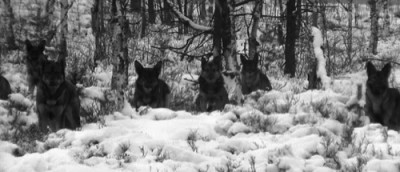
It's an articulation sublimely achieved by Vlacil, who places the characters in the throes of a palpable, roiling perpetual tension between the purely animalistic origins of humankind -- a pack of ravenous wolves is a recurrent, stunningly shot motif, as are all manner of livestock, seasonal/agricultural exigencies, and omnipresent earth-wind-fire elements -- and the idea, dawning with excruciating, mysticism-shrouded slowness during the period depicted and breaking through the film's dark, heavy earthiness at careful intervals like some penetrating, all-illuminating sunburst, that each human life is a precious mystery with an innate value, dignity, and future to it. The indelible figure of Marketa is forged over the course of the film by the competing forces of ordering superstition and religion, primordially unreconstructed human/animal nature, fear, and love to emerge finally as something that it doesn't feel too grandiose, in this context, to call a whole new kind of human being. The conclusion of her journey (which is really only the beginning of another one that, we can believe, will be freer, lighter, and less menaced) is transcendent, a sort of momentous birth and evolutionary step that rivals even the ending of 2001 (a contemporaneous film to which Marketa Lazarova is oddly equivalent in scope, tone, and perspective if not in story time or aesthetic approach -- not to mention the two films' matching eerie, towering archaic-modernist choral-classical scores, Marketa Lazarova's provided by composer Zdenek Liska). This film is not a parable for modern times but an immersive, tangible, immediately and powerfully present reminder of where we came from. A real, deeply eerie, alternatingly brutal and ecstatically transcendent trip that lingers heavily in the imagination and irresistibly beckons you back with its dark, singular enchantments, Marketa Lazarova is a movie out of time, a sophisticated sensory experience that brings to impossibly vivid life an uncanny, violent mode of pre-civilized human existence from a time that has only left haunting, vaguely discernible traces on its shadowy, irrational, half-hidden page of history.
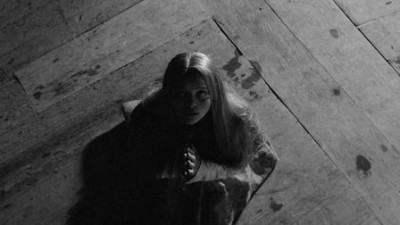
Video:
The transfer of the film (AVC-MPEG4, 1080/24p, at its original widescreen aspect ratio of 2.35:1), which represents a complete digital restoration from 2011 (detailed in a supplement; see "extras" below), is rarely less than stunning; when one considers the age of the materials and the job that's done, and the extreme rarity of any signs of print wear or age, it's downright laudable, better than could have been hoped for. Bedrick Batka's beautiful and radiant black-and-white cinematography runs an extensive gamut from white-screened, direct-into-the-camera exterior sunlight to the darkest interior/firelit scenes with the most minutely variegated shadows, and it all comes through with amazing clarity, depth, solidity, and sharpness, the variegations in the contrast represented with uniform fidelity and absolutely no signs of aliasing, edge enhancement/haloing, or anything but the most judicious use of digital noise reduction (DNR), leaving the film's cinematic feel arising from the natural celluloid-like grain of the picture intact. Overall, the visuals of this fantastic-looking film have absolutely been given the treatment it merits.
Sound:The PCM 1.0 uncompressed monaural soundtrack (in Czech with optional English subtitles) perfectly preserves the film's unique sound design -- the (post-dubbed) echoing, portentous quality of these mythological characters' voices; the deep swelling and high-note straining of Zdenek Liska's eerie, timelessly dissonant orchestral/choral score -- all with no evident flaws of imbalance, muffling, or any undue distortion, hiss, or crackling.
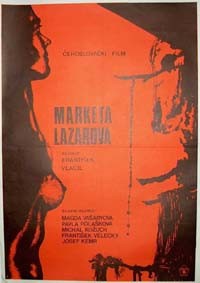
--In the Web of Time, a 20-minute documentary short that features director Frantisek Vlacil, filmed in the late 1980s, discussing his approach to filmmaking (as an art historian, as a self-taught independent, as one who likens film to music and architecture and the editing process to poetry) and, tantalizingly, representative clips chosen from throughout the director's rich filmography.
--A 17-minute interview with film historian Peter Hames in which Hames brings his considerable expertise and knowledge to bear on Vlacil's unique history as a filmmaker (unlike all his Czech peers, he never actually went to film school and was more or less self-taught through experience) and, in particular, Marketa Lazarova's journey, under Vlacil's guidance, from novel to film (including the director's considerable research into the Middle Ages), as well as Vlacil's singular, obsessive commitment to the hallucinatory, heightened-reality medieval-mystical authenticity he envisioned for the film.
--A 10-minute interview with film critic/journalist Antonin Liehm, a friend of Vlacil's, in which he discusses the origin of the audacious idea to film Vancura's novel and why, in his opinion, Marketa Lazarova is one instance where a great novel has been made into a necessarily very different, but equally great, film.
--"Marketa's Actors," a 40-minute program, made this year by Criterion, in which the film's principals, interviewed in the present day -- Magda Vasaryova (Marketa), Vlastimil Harapes (the young German count), and Ivan Paluch (one-armed Adam), a highly intelligent, lively, and articulate bunch -- individually reminisce on their own biographies, being cast in Marketa Lazarova, the experience of working with Vlacil, and their own ideas on and impressions of their characters and the film.
--A 27-minute interview with costume designer Theodor Pistek, who delves into his long-term collaboration with Vlacil and the special challenge of creating authentically -- not typically period-piece-like -- medieval costumes for Marketa Lazarova's 13th-century characters.
--A gallery of storyboards prepared by Vlacil, in his typical creative process, as preproduction templates for the film.
--An interview with restoration technical director Ivo Marak (11 min.), who offers a remarkably detailed step-by-step rundown -- accompanied by footage taken during the restoration itself -- of the frame-by-frame process of restoring Marketa Lazarova to the current near-pristine state in which it appears on the Blu-ray disc.
--The film's original theatrical trailer.
--A 40-page booklet, printed on high-quality card stock and luxuriantly illustrated with images and graphics from the film, containing an essay by University of Chicago film professor Tom Gunning; a brief but very enlightening novel-to-film study by translator Alex Zucker (who's currently working on an English translation of the novel Marketa Lazarova), including relevant observations from Milan Kundera, probably the best-known Czech novelist internationally; and a 1969 interview with director Frantisek Vlacil by journalist Antonin Liehm.
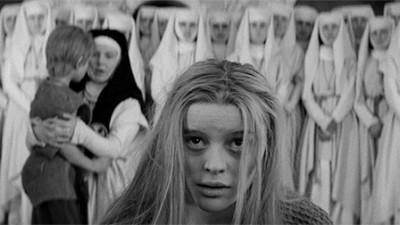
The only remotely predictable thing about Criterion's excellent new Blu-ray edition of Czech director Frantisek Vlacil's 1967 masterpiece is that by now, we're all well accustomed to the good folks at the Collection bringing lost or unacknowledged world-cinema treasures to our attention, for which one can only express, once again, gratitude for the newfound prominence and accessibility granted by a conscientiously prepared and presented new release to such an astoundingly accomplished, original film. Marketa Lazarova is a dizzying step far back into the mysterious, mystically-minded Middle Ages, but it's no period piece, nor even a modern-world-aimed allegory like Bergman's also-medieval Seventh Seal. What the film is, indelibly and rapturously, is a visceral, full-blooded (in every sense) immersion in medieval thinking, what the world looked and felt like to our 13th-century forebears. Its story of two middle-European clans' increasingly vicious, murderous feud as the world around them experiences the violent birth pangs of what would become rule-of-law civilization appear on the screen before us in a way that's quite literally magical, heavily intoxicated with an uneasy but sincere hybrid belief in the battling but overlapping pagan and Christian mythologies of the era. The result is something whose look and feel are somewhat reminiscent of the audacious experimentation of Vlacil's Soviet-bloc peers, the Tarkovsky of Andrei Rublev and the Kalatozov of The Cranes Are Flying, but no comparison quite does justice to Marketa Lazarova's own dense, dark, dynamic power, which isn't really quite like anything else. It's the perfect marriage of the primitive and the modern, of narrative and experimental cinema, leaving the unshakable impression that this is just how the most highly skilled medieval bard's epic, emblematic, and strange story of lust, revenge, and striving from animalistic chaos toward some chimeric future human peace and wholeness would have unscrolled had the movie camera, not the lute and the voice, been the instrument at hand. Highly Recommended.
|
| Popular Reviews |
| Sponsored Links |
|
|
| Sponsored Links |
|
|
| Release List | Reviews | Shop | Newsletter | Forum | DVD Giveaways | Blu-Ray | Advertise |
|
Copyright 2024 DVDTalk.com All Rights Reserved. Legal Info, Privacy Policy, Terms of Use,
Manage Preferences,
Your Privacy Choices | |||||||









